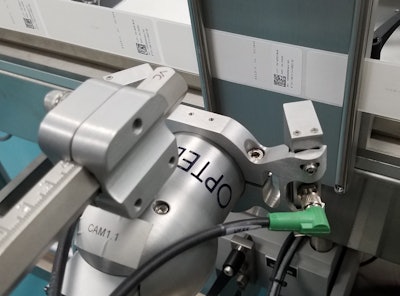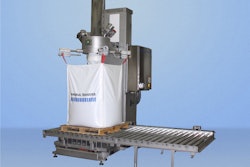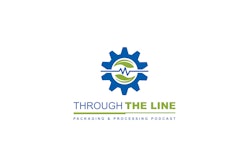One can only imagine the number of calendar alerts set to trigger pharmaceutical professionals come Nov. 26, 2018.
Of course, that’s the date the Drug Supply Chain Security Act (DSCSA) serialization enforcement deadline takes effect in which manufacturers must provide unit-level product identifiers on their drug packages. The 2018 date represents a one-year delay granted by FDA in the enforcement of the requirement for manufacturers to affix or imprint product identifiers. Actual DSCSA compliance was Nov. 27, 2017.
Although studies have shown that some pharma manufacturers and contract packaging/contract manufacturing organizations have a way to go to meet the upcoming enforcement deadline, Reed-Lane is in good shape.
Headquartered in Wayne, NJ, Reed-Lane is a pharmaceutical contract packager (CP) that provides packaging to the pharmaceutical market for both prescription and over-the-counter products. FDA-audited, and Drug Enforcement Administration-licensed to package class III-V drugs, Reed-Lane specializes in blister packaging, bottling, wallet carding, pouching and convenience vial filling for solid-dose products as well as secondary packaging and kitting. With new cold storage capacity, Reed-Lane is positioned to label and package temperature-controlled products.
To help its customers meet the serialization enforcement deadline, the CP employed Vantage Solutions, a manufacturing productivity organization that works in strategic guidance, serialization, compliance and automation.
Reed-Lane first encountered Vantage at a serialization seminar where the consulting group’s Portfolio Director Frank Guthrie was speaking. At that time, Vantage was consulting with one of Reed-Lane’s customers.
“We first engaged with Vantage Solutions as a subject-matter expert on the validation of the transmission of data from our carton serialization line to our Level 4 system,” notes Reed-Lane Chief Financial Officer Carmine Sodora. “Shortly thereafter, we initiated a project to implement serialization with aggregation into two existing solid-dose bottle filling lines.”
Richard Wrocklage, Reed-Lane’s Director of Package Development, explains that the project involved the purchase of a new labeler, equipment to print serialized data carriers and aggregate bottles to cases and cases to pallets, and to receive and transmit serial numbers and finished batch files.
“The equipment needed to be integrated into two active lines,” he says. “It was critical that the impact on the operation of these lines for implementation of this project be kept to a minimum.
“Having already purchased, installed and qualified a carton serialization line, we understood the additional complexities that serialization added to the packaging process. We knew we would benefit from the diverse knowledge and experience Vantage displayed on our previous engagement.
“As a contract packager we strive to give our customers a high level of confidence by partnering with suppliers that are established as leaders in the industry. We found that Vantage had experience with the preferred vendors for this project: Optel Group, NJM, Domino and TraceLink.”
Vantage provided Reed-Lane with assistance on multiple aspects of its serialization project, including the following:
• Line layout
• User Requirement Specifications (URS)
• Factory Acceptance Testing (FAT) protocol development and execution
• Site Acceptance Testing (SAT) protocol development and execution
• Installation/Operation Qualification (IOQ) protocol development and execution
• Packaging Qualification (PQ) protocol development and execution
• Validation Master Plan (VMP) development and updating or creation of Standard Operating Procedures (SOPs) for the serialized lines
Says Wrocklage, “Through all of the documentation development, Vantage worked closely with end-user [customers] to ensure that all deliverables matched up with existing Reed-Lane procedures.”
Joseph Byrdak, Reed-Lane’s Packaging Process Engineer, adds, “Vantage provided aggressive project management to keep the creation, review and approval of all Reed-Lane and vendor-supplied documentation on track. Through weekly conference calls with all parties, the Vantage project manager monitored all ongoing processes and helped keep the resources at Reed-Lane and the involved vendors well-coordinated.”
Packaging operations
Flexibility is vital for contract packagers, which is the case with Reed-Lane, whose 24 packaging lines offer capacity for multiple customers—or can be dedicated to one customer or product, depending on needs or volumes.
Addressing challenges and concerns
In the following Q&A, Wrocklage discusses some of the key serialization issues faced by Reed-Lane and its customers.
HCP: What are the key concerns Reed-Lane has pertaining to serialization and aggregation issues and deadlines?
Wrocklage: We do not have concerns with aggregation, deciding to implement [this aspect] ahead of the legislated deadline. Our concerns with serialization are along the lines of the industry holding to the November 2018 extension and realizing a return on the investment in serialized capabilities.
HCP: Why did Reed-Lane add aggregation at the same time as serialization?
Wrocklage: We decided that aggregated serialization would provide all our customers with the best solution and would be more cost-effective and time-efficient rather than implementing aggregation later.
HCP: Did the company implement a solution on all of your packaging lines at once or take a step-by-step approach?
Wrocklage: Reed-Lane followed a rolling implementation approach to maintain focus on one installation (or line) at a time and to apply the lessons learned with previous installation to subsequent installations.
HCP: Have you experienced benefits from serialization? Has Overall Equipment Effectiveness been negatively impacted?
Wrocklage: It is too early in the process to identify benefits we may realize from implementing serialization. There is considerable data becoming available, so the potential [to reap benefits] is out there. We are experiencing a slight dip in line startup times as the operational staff becomes acclimated to the new procedures.
HCP: How did Reed-Lane select serialization providers?
Wrocklage: The selected vendors presented a superior solution and displayed the organizational growth necessary to support their solutions. Optel in particular had depth in providing the vision offerings applicable to a serialized system and they were expanding their support staff to meet the upcoming demand.
We view the relationships we have with our customers as a partnership. We take the same approach with our vendors, looking for partners willing to make the long-term commitment that will be beneficial to both organizations. The results of these partnerships with dynamic vendors intent on offering superior solutions and support allow Reed-Lane to do the same with our partner-customers for years to come.
HCP: Were there any specific challenges you encountered during implementation and early on during production runs?
Wrocklage: Following the Vantage recommendations we performed a great deal of the development work, such as fine-tuning the printing, inspecting and flow with the different equipment involved with the process before we installed the system into the production environment. We have experienced some of the acclimation impact that everyone has to go through. But having the system fully operational offline allowed us to perform most of the basic training prior to final installation.
HCP: Did you need to hire more staff/operators to incorporate serialization efforts? Also, did Reed-Lane train existing personnel or hire new people for these tasks?
Wrocklage: We identified key personnel within the organization as a base and hired additional staff to build on that base. For the most part, the staff has been very receptive. Some people were a little cautious at the beginning while others were intrigued by the capabilities of the process. As people become more familiar [with serialization processes] they’re happy to be part of something that is redefining our industry.”
Top Three Takeaways:
- Implementing serialization and aggregation at once benefits Reed-Lane and its customers.
- An experienced consulting service helped identify preferred solution supplier-partners.
- As employees become familiar with serialization, they identify with being a part of an issue that is “redefining the industry.”
Reed-Lane demonstrates pharmaceutical packaging proficiency
• Pharmaceutical Industry Presses Forward with Serialization Strategies
• Reed-Lane Prescribes New Topserter for Solid-Dose Bottling Line
• Contract Packager Builds Blister Packaging Business























